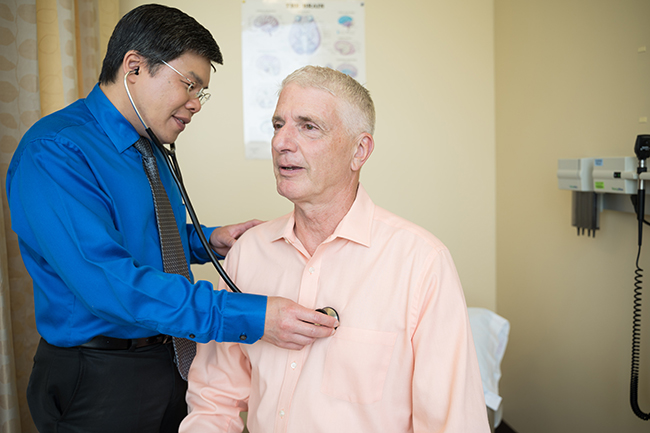Leukemia Diagnosis and Treatment

The OHSU Knight Cancer Institute offers the most advanced care for leukemia, including lifesaving Gleevec and immunotherapy. Our care also includes:
- Care from some of the world’s leading experts in blood cancers.
- Many specialists who meet weekly to discuss patients one by one.
- The latest immunotherapies for blood cancers, including leukemia.
- Nurse coordinators to help arrange your appointments and answer questions.
- A state-of-the-art bone marrow transplant program.
- Access to clinical trials that test promising new therapies.
Leukemia treatment overview
Your care team will tailor treatment recommendations to your needs and leukemia type. Some treatments aim to cure leukemia. In other cases, the best option is to try to manage it. We also provide complete monitoring after treatment.
Team-based approach: Our leukemia specialists come together, formally and informally, to discuss your diagnosis and review test results. Together, they develop the best treatment recommendations for your needs. Experts on your team may include:
- Hematologists, who study blood and blood diseases
- Hematopathologists, who study blood cell diseases
- Medical oncologists, who treat cancer using medications
- Radiation oncologists, who treat cancer with radiation therapy

Diagnosing leukemia
We offer the highest level of diagnostic services, including:
- Molecular profiling: Your leukemia will be analyzed at the Knight Diagnostic Laboratories as a standard part of your care. Understanding your leukemia at the genetic level helps us choose the most effective treatments.
- Expert hematopathologists: Our specialists in blood cells and blood diseases will give you a precise diagnosis.
Blood tests
We offer a full range of blood tests to detect and identify leukemia. They include:
- Blood chemistry to measure traits such as blood cell size and appearance.
- Complete blood count to measure the number of platelets, and red and white blood cells.
- Cytogenic analysis to look at the chromosomes (DNA) in cells to detect abnormalities.
- Fluorescence in situ hybridization (FISH), which uses fluorescence (molecules that absorb light) to find genetic defects we can target with treatments.
- Immunoglobulin testing to measure infection-fighting antibodies.
- Immunophenotyping to look for markers on a blood cell’s surface (antigens) that help us identify the type of leukemia.
Bone marrow tests
Doctors analyze bone marrow, where white blood cells are made, to understand the stage and extent of leukemia. These tests use a hollow needle inserted into bone:
- Bone marrow aspiration collects fluid.
- Bone marrow biopsy collects tissue.
Leukemia treatments
Transfusion: You receive blood from a healthy donor to replace red blood cells and platelets. This can help you feel better and fight infections.
Leukapheresis: In this procedure, blood is removed from your body, sent through a machine that pulls out abnormal white blood cells, then returned.

Hormone therapy: Hormones given as pills or shots can stimulate your bone marrow to create more red blood cells and platelets. This can help fight certain types of leukemia.
Surgery: If leukemia enlarges your spleen, causing discomfort and lower blood counts, we might recommend removing it (splenectomy). The spleen is an immune system organ that filters your blood. Your liver and lymph nodes can take over for the spleen, but you may be more vulnerable to infections.
Chemotherapy: Medications, usually in combination, are given as pills or by IV to kill cancer cells. Your regimen (combination of medications) will be tailored to your leukemia type and its rate of progress.
Targeted therapy: Medications given as daily pills target leukemia cells at the molecular level. They leave healthy cells mostly alone, greatly reducing side effects.
- Gleevec: Pioneering research by OHSU’s Dr. Brian Druker led to this breakthrough targeted medication. With Gleevec, patients who once faced a life-threatening diagnosis can now often expect a normal lifespan.
Immunotherapy: These medications harness your immune system to attack cancer cells. They offer particular promise for blood cancers that have resisted other treatment.
- Kymriah: OHSU was the first Northwest hospital to offer Kymriah, a CAR T-cell therapy, after it was approved by the U.S. Food and Drug Administration in 2017. In this therapy, your own immune system T cells are modified to fight cancer, then returned to your body in an IV. In adults up to age 25, Kymriah is approved to treat certain cases of acute lymphoblastic leukemia (ALL).
Radiation therapy: We use external beam radiation therapy (high-energy beams delivered by a machine outside your body) to destroy cancer cells. Radiation therapy is often used to treat advanced or aggressive leukemia. It may be given alone or with chemotherapy.
Bone marrow/stem cell transplant: Your care team may consider a bone marrow or stem cell transplant if other treatments aren’t working or if your leukemia returns after treatment. Chemotherapy or radiation therapy will be used to destroy diseased cells before you receive transplanted healthy new cells.
Additional services
We offer many services to support you and your family, including:
- Palliative care: Our palliative care team can help you and your family relieve stress and symptoms.
- Support services: Nurse coordinators will answer questions and help you make appointments and get prescriptions. Our cancer social workers can help emotional, financial or other concerns.
- Rehabilitation: We offer specialized rehabilitation care to help you recover from cancer and cancer treatment.
- Survivorship clinics: We want to understand why a small portion of patients develop a blood cancer after having chemotherapy. We offer a clinic to watch for signs and to help us prevent these secondary leukemias.
Learn more
- Treating Chronic Lymphocytic Leukemia (CLL), American Cancer Society
- Treating Acute Myeloid Leukemia (AML), American Cancer Society
- Treating Acute Lymphocytic Leukemia (ALL), American Cancer Society
- Treating Chronic Myeloid Leukemia (CML), American Cancer Society
- Treating Chronic Myelomonocytic Leukemia (CMML), American Cancer Society
- Drugs Approved for Leukemia, National Cancer Institute
Locations
Knight Cancer Institute, South Waterfront
Center for Health & Healing, Building 2
3485 S. Bond Avenue
Portland, OR 97239
Free parking for patients and visitors
Refer a patient
- Refer your patient to OHSU.
- Call 503-494-4567 to seek provider-to-provider advice.
Cancer clinical trials
Clinical trials allow patients to try a new test or treatment.
Kids and teens

Read more
Learn more about OHSU Knight Cancer Institute treatments: